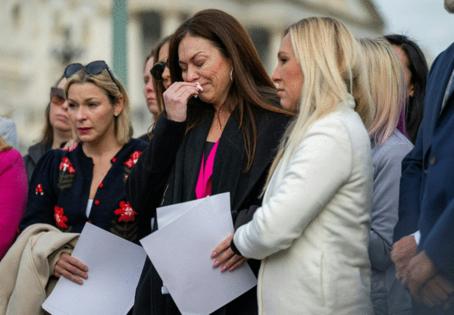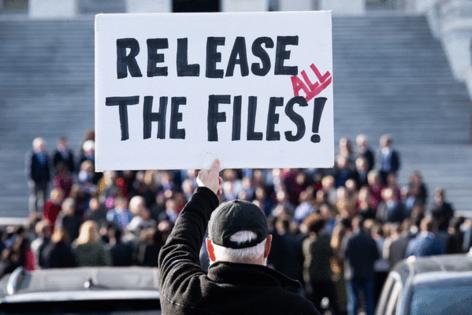House votes to release Epstein files, nearly 20 years after first sex charges
Published in News & Features
The U.S. House of Representatives overwhelmingly approved legislation Tuesday that marks the first step in releasing the government’s criminal case files involving sex trafficker Jeffrey Epstein.
The Department of Justice has kept most of the files under seal for almost two decades — since 2007 when the FBI and U.S. attorney’s office in South Florida first opened an investigation into whether Epstein had been sexually abusing underage girls at his Palm Beach mansion.
There are still several hurdles required before the files would be released, and even then, it’s not clear to what extent the documents would be easily decipherable. House Speaker Mike Johnson indicated there will likely be swaths of material that would be redacted.
President Donald Trump, who first promised to release the files during his election campaign — later changed his mind and fought making them public before finally reversing course in recent days and again calling for them to be released. After survivors released a powerful video over the weekend, a number of Republicans indicated they were leaning toward voting for the petition. Trump then directed all Republican House members to vote for the measure.
The Senate will now take up the issue. In the Senate, 17 Republicans would need to vote with Democrats to reach the 60-vote supermajority threshold required to pass it. Trump has said he will sign the measure.
Trump could expedite the process by issuing an order to the DOJ to unseal the records, although he has not done so thus far, satisfied to allow political gamesmanship play out between Republicans and Democrats in Congress.
Johnson, who refused for months to swear in a new House member who would cast the deciding vote on a discharge petition forcing the vote, also switched gears Tuesday, saying he would support the measure. But he slammed Democrats for “forcing a political show vote” on the files.
Survivors made their frustration with Trump’s handling of the files clear on Tuesday, as they appeared at the Capitol for a news conference.
“I beg you President Trump to stop making this political,” said Jena-Lisa Jones, who said she was 15 when she was sexually molested by Epstein in Palm Beach.
“This is not about you, President Trump. You are our president, start acting like it! Show some class. Show some real leadership ... I voted for you, but your leadership on this issue has been a national embarrassment. It is time to take the honest, moral ground and support the release of these files — not to weaponize pieces of the files against random political enemies that did nothing wrong.”
Portions of what are contained in the government files have been made public in the past through court proceedings. They include Epstein’s flight logs, some victims statements and emails that were exchanged between Epstein’s lawyers and federal prosecutors as part of the federal case against him in Florida in 2007 to 2008.
The push to release more of the files garnered support from across the political spectrum. Reps. Thomas Massie, a Kentucky Republican, and Ro Khanna, a California Democrat, joined together to persuade House members to pass the bipartisian legislation.
Its passage comes almost two decades since a parent first notified Palm Beach police that a girl had been sexually molested by Epstein in his Palm Beach mansion.
That initial probe led to a plea agreement that gave him federal immunity, allowing him to evade sex trafficking charges that would have put him in prison for life. Alex Acosta, the U.S. attorney in Miami, signed off on the deal after meeting one of Epstein’s lawyers.
The fact that Epstein was able to manipulate such a lenient plea deal has fueled questions about whether his ties to influential people led to a cover-up of his crimes.
After he was elected in 2016, Trump nominated Acosta as labor secretary.
In November 2018, the Miami Herald published an investigation into the case that revealed DOJ prosecutors not only minimized the scope of Epstein’s crimes – they also secretly negotiated the plea deal without informing his victims in violation of the Crime Victim’s Rights Act.
After the series ran, federal prosecutors in New York opened a new case against Epstein, and he was arrested in July 2019. A month later, on Aug. 10, he was found dead in his cell. His death was ruled suicide by hanging. Acosta also resigned his Cabinet post.
In July 2020, Epstein’s former partner, Ghislaine Maxwell, was arrested on federal charges related to sex trafficking. She was convicted in 2021. Asked about her arrest at a press conference shortly after, Trump told reporters, “I just wish her well.” Maxwell was convicted and sentenced to 20 years in prison in June 2022.
“I’ve met her numerous times over the years — especially since I lived in Palm Beach, and I guess they lived in Palm Beach — but I wish her well, whatever it is,” Trump said.
Under pressure from Congress, the DOJ opened a probe into Florida prosecutors the same year Epstein died. A report issued in 2020 concluded that Alex Acosta, the U.S. attorney in Miami who supervised the case, made the decision to resolve the investigation with a state plea deal that involved solicitation of only one victim – when there were dozens of others. But while the DOJ concluded that Acosta’s actions showed “poor judgment” the probe did not find evidence of misconduct or corruption.
However, more evidence has surfaced over the years. Among other things, recent files from Epstein’s estate shows that years after he received his “sweetheart deal” in Florida, he had multiple dinners with one of the chief prosecutors handling his case in Florida. Matthew Menchel, who was chief of the criminal division, had dinners, meetings and phone calls with Epstein between 2011 and 2017. Menchel has denied any wrongdoing but has not explained why he met with the sex trafficker.
Epstein’s survivors have mobilized in recent months to lobby Congress to release the files in the wake of the Trump administration’s decision to close the book on the case.
In February, Attorney General Pam Bondi vowed that the files were on her desk, then released several binders of documents to social media influencers. Almost immediately it was clear that the binders contained material that had been made public years earlier.
Then in July, the DOJ and FBI abruptly changed gears, announcing they would close the case, that no files would be released and that no evidence was found implicating anyone else in Epstein’s crimes. The move led to a backlash, particularly among far-right media influencers who began raising questions about Trump’s role in the decision.
Trump has repeatedly said that he ended his association with Epstein in the mid 2000s after he learned that Epstein was hiring away some of the young female employees at Trump’s Palm Beach resort, Mar-a-Lago.
To date, there has been no evidence linking Trump to Epstein’s crimes.
On July 24 and 25, Todd Blanche, the U.S. Deputy Attorney General and Trump’s former personal attorney, traveled to Florida to interview Maxwell in prison. Not long after, the Bureau of Prisons confirmed that she had been transferred to a minimum-security federal prison camp in Bryan, Texas, drawing widespread criticism. A leaked email obtained by the House Judiciary Committee and viewed by the Herald appears to show Maxwell seeking to commute her sentence.
A recent cache of more than 20,000 documents submitted to the House Oversight Committee by Epstein’s estate shows that, even after Epstein’s 2008 conviction, Trump remained front and center in Epstein’s conversations with powerful people. Trump’s name was mentioned over 1,000 times – more than any other person – in Epstein’s emails. Most of those emails postdate the time when the two were friends.
In one of them, Epstein mentions that Trump “knew about the girls,” and Epstein also implied that he had dirt on Trump that would “take him down.”
The messages about Trump were released by the committee Wednesday. They were obtained from Epstein’s estate pursuant to a subpoena — and are separate from “the Epstein files” that members of Congress are trying to pry out of the Department of Justice and the FBI.
The emails span a decade, from about 2009 to Epstein’s arrest in July 2019. Part of that period includes December 2018 — right as Epstein was once again under scrutiny.
©2025 Miami Herald. Visit miamiherald.com. Distributed by Tribune Content Agency, LLC.










Comments